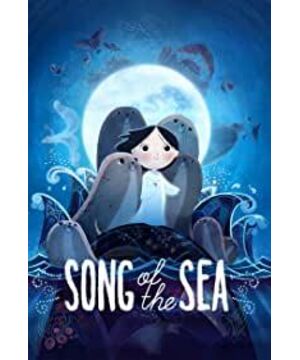"Song of the Sea" and "Kaguya Ji Monogatari" have several common cultural cores, the most striking is the "homesickness" temperament between the two connotations. The nostalgia of "Song of the Sea" lies in the sea, and The homesickness of "The Story of Kaguya Ji" is in the mountains and forests, and the different attributions of homesickness in Eastern and Western civilizations originate from geography. "Song of the Sea" has an obvious anti-industrial color. After the two little protagonists in the film came from the sea to the gloomy big city, they have been concerned about the island in the sea. The whole story revolves around the two little protagonists who have gone through a thousand difficulties Wan Xian returns to the island as the main line. This yearning for the ocean is also a return to freedom. In contrast, "Kaguya Ji Monogatari" reveals more of an anti-secular temperament. Kaguya Ji in the film also grew up since childhood. Growing up in the mountains and forests, he was eventually forced to come to Kyoto, Japan. However, I was always concerned about the forests I grew up in. Even in the last days, my mind and body would have to wade through the water and return to the original place where I grew up. In the mountains and forests, this yearning for the mountains and forests has the temperament of "retreat" in the bones of traditional Orientals. Saying goodbye to the secular world and converting to Nanshan, this has been the pursuit of inner freedom by the Orientals for thousands of years. More coincidentally, the protagonists in the two movies did not appear as ordinary people. Kaguya Ji in "Kaguya Ji Monogatari" is a fairy growing in a bamboo, while the seal fairy in "A Song of the Sea" is an ocean Fairies in here, where they grew up is where their homesickness lies. The Oriental cultural circle (all the Oriental here refers to the Chinese cultural circle) is mostly inland, while the West is biased towards the sea. The limited land and the vastness of the sea are also Determines the different interpretations of freedom between the two cultures. Gods always leave. Kaguyaji cannot choose not to. She can only leave the world in the transcendence. But the seal fairy can choose to stay. Eastern and Western cultures have a myth. The different expressions of the role of individual will in the legend can also make people feel the significant difference between cultural temperament, but this difference is based on aesthetics, and the language of aesthetics is common to all mankind. But why do we need to use mythology to convey metaphors of the world? Mythology is still social in nature, but its primitive power will undoubtedly magnify its artistry. In mythology, whether it is a vast and turbulent ocean or a mountain forest full of vitality, the vitality shown in the primitive power is Immortal.
In addition, the two movies are all about searching. Kaguya Ji hopes to find peace of mind in nature under the shackles of the surrounding world. This is an introverted pursuit of freedom, and the search for freedom in "Song of the Sea" is even more important. Strong and eager, they liberate not only themselves, but also the rescue of national traditional culture and nature. The introverted, unrestrained temperament and contrast between the two are enough to make people feel the different charms between Eastern and Western cultures. These apparently different temperaments are not divisions. Their orientation is the same. What they carry is the nostalgia of all nations, which is unclear and unclear. The pursuit of freedom and the return to nature and simplicity are not all. Is it the common sustenance of all mankind?
The painting of "Song of the Sea" inherits the essence of European animation works, and is separated from industrial assembly line animation. The simplicity of hand-painted is obviously closer to the attitude of the movie itself, and the eclectic temperament of European animation allows each frame to be independent. Become exquisite works of art, these exquisite hand-painted images always remind us that this is not a product on the assembly line, it is a handmade artwork and cannot be copied. In the yearning and reverence for the ocean, the film is the final choice After returning to this mother topic, combined with the interpretation of traditional myths, the film’s strong sense of national self-identity can still break through the limitations of geography and language, making people feel the high degree of consistency in the understanding of beauty across the world. Besides, the Japanese Kaguya Ji Monogatari is naturally a purely hand-painted animation work. Compared with the strong and bright colors and exquisite content in the images of European animation works, the quaint temperament of oriental aesthetics will appear more calm, with a lot of white space and The simple lines can still make people feel the fineness and dedication of the painting composition. The different methods of the two paintings ultimately serve the common aesthetic theme. The high degree of consistency in temperament, connotation and expression means of the two is unforgettable. It is not an exaggeration to say that they have reached the same goal by different means.
No matter how turbulent the waves, how rugged the mountains and forests, homesickness is always sad and beautiful, it is evidence that the Tower of Babel does not exist, it is also our common return, but its meaning is to tell us that all of this is difficult gone back.
Private notes, reprinting is prohibited
View more about Song of the Sea reviews










